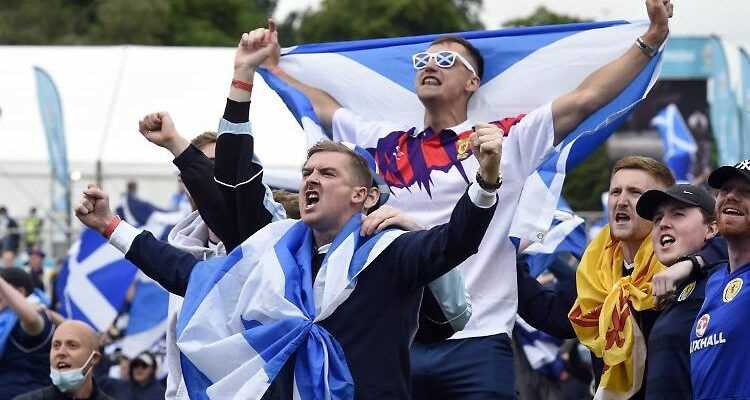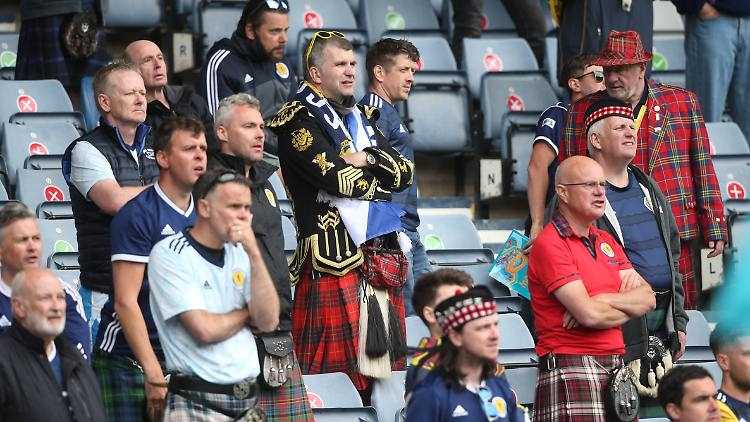Monday 14 June 2021
Schick crashes into happiness
50 meter goal destroys Scottish European Championship party
By Hendrik Buchheister, Glasgow
For the first time since 1998, Scotland is back in a football tournament. The start against the Czech Republic in Glasgow begins as a big celebration – and ends in mourning thanks to Patrik Schick from Leverkusen. The Scots’ comeback could be over quickly.
The little man’s catwalk was a sidewalk. More precisely: the sidewalk in front of the “Honey & Salt” café on Carmunnock Road in the Glasgow district of Mount Florida, within sight of Hampden Park. Inside, in the café, the customers sat with coffee and vegan brownies, outside the Scottish football crowd got in the mood for the European Championship match against the Czech Republic, the Scots’ first appearance at a major tournament in 23 years. A middle-aged, medium-athletic Scot, in a kilt and with a bottle of wine in his hand, walked slowly in front of the window of the café, twisted his arms, paused for a moment – just as if he were a supermodel, not a medieval, medium-athletic Scot Kilt and wine bottle. The people at the tables by the window registered his appearance with a look that said: Uh? What?
Scotland at a major football event – that’s really something unbelievable. While their southern neighbor, England, has been counting the years since the last and, as is well known, only triumph (there are now 55 since the World Cup title in 1966), the Scots have had to wait since the 1998 World Cup to finally be on the big stage again. Goalkeeper David Marshall ecstatic the country when he blocked Aleksandar Mitrović’s decisive attempt on penalties in the qualifying playoff against Serbia in November, ending Scotland’s “23 years of hurt”.
A real chance of the knockout round – or not
Even more incredible than the simple presence of the Scots at the European Championship is the fact that they are not just there to fill the field. Thanks to Premier League pros such as Liverpool FC’s Andrew Robertson, Manchester United’s Scott McTominay, Arsenal FC’s Kieran Tierney (missed against the Czech Republic) and Aston Villa’s John McGinn, they have the sincere hope of making it through the first round ever in Scottish tournament history. However, this hope received a brutal blow at the start of the European Championship. Patrik Schick from Bayer Leverkusen played the party crasher with his two goals for the 2-0 success of the Czechs. His second hit was a work of art rarely seen. From almost 50 meters he lifted the ball over Marshall into the net and did something that is actually an impossibility – he silenced Hampden Park.
Scotland’s fans had actually come to celebrate: themselves, their team, the return to the circle of serious football nations, possibly a little bit the return of life. For the first time since November 2019, a Scotland home game took place in front of spectators, in front of 9,847 of them to be precise. They made so much noise that one could think there were ten times the number of visitors. The most wonderful scene came a quarter of an hour before kick-off when the stadium DJ played the song “Yes Sir, I Can Boogie” by the Spanish pop duo Baccara. The whole audience danced and sang to it. The song is something like the unofficial national anthem of Scotland since the team celebrated the European Championship qualification in the dressing room in November after defeating Serbia. Prime Minister Nicola Sturgeon has also come out as a fan of the song, albeit in the version of the Fratellis.
Lots of men with their arms crossed
The first half against the Czech Republic was still somewhat to the taste of the Scots. The team approached the opponent’s goal passably several times. Not really mandatory, but still. As a Scotland you can’t expect to hit an opponent against the wall. Schick’s first head-on goal shortly before the break was still somewhat overwhelming, but with his marvel from almost 50 meters shortly after the restart, the atmosphere in Hampden Park collapsed. There was little to be heard. Here a “Come on, Scotland!”, There an insult to the German referee Daniel Siebert – there wasn’t much more from the Scottish audience. If you looked around the stands, you saw many men with their arms crossed. They looked like they were waiting for something. Probably for the final whistle. The gray sky was suddenly a little grayer, the cool wind was blowing even cooler.
The Scots had more possession and more shots than the Czech Republic for over 90 minutes, but they deserved to lose and experienced a disillusionment, an anti-climax, when they returned to the tournament. Coach Steve Clarke, once assistant to José Mourinho at Chelsea, said afterwards that the teams weren’t far from each other in terms of play, but the Czechs were efficient in exploiting opportunities. “We’re not at this tournament to learn. But sometimes you still learn your lesson. It happens,” said Clarke.
The defeat hurts, because the Czech Republic was by name Scotland’s simplest opponent in the preliminary round group D. On Friday, the big, arrogant neighbor England, the “Auld Enemy”, will be played in Wembley Stadium, then Croatia will be runner-up in Hampden Park present. It is quite possible that the Scots’ comeback to the tournament will only last three games. The fans also seem to suspect that Scotland’s EM could be a dreary affair. After the end of the game against the Czech Republic, there were whistles. Less than five minutes later, the stadium was almost completely empty. Only a few Czech supporters were still there celebrating with their team. They had driven the host from his own party. And indeed: the sun was shining above them.
.

